Most scholars agree that God created the Garden of Eden in Mesopotamia — the land between the Tigris and Euphrates Rivers–and that he placed the first people there–Adam and Eve.
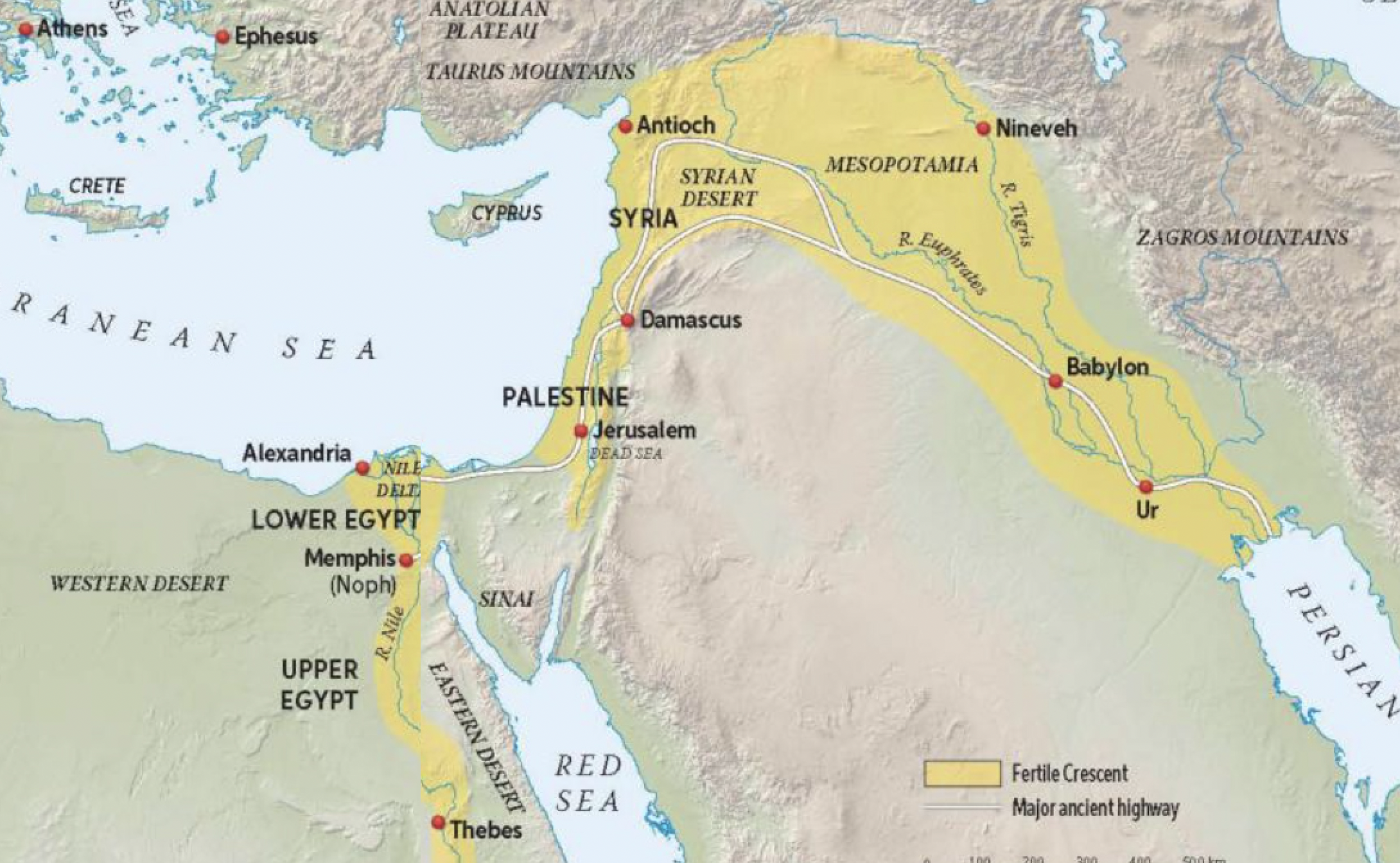
Image Credit: Detail of a Map from the Student Bible Atlas by Tim Dowley:
On the above map, Mesopotamia is the upper area that is colored dark yellow. Near the bottom of that area, you will see the City of Ur. Ur was the Chadean homeland of Abraham and his father’s family.
Who Were the Chaldeans? Where Is Chaldea? Were the Magi Chaldean?
That area is located in what is currently called Iraq. During the time of Abraham, this area was polytheistic, and the people worshipped idols.
Mesopotamia in Bible History – Pagan gods & the Idols – Ancient Mesopotamian Paganism
God told Abraham to leave Ur and to begin his own family line north of there. Initially, Abraham [who was first named Abram] settled in Haran, but ultimately, he and his family moved to the area that would later be called Canaan–part of that area is currently called the Gaza Strip. 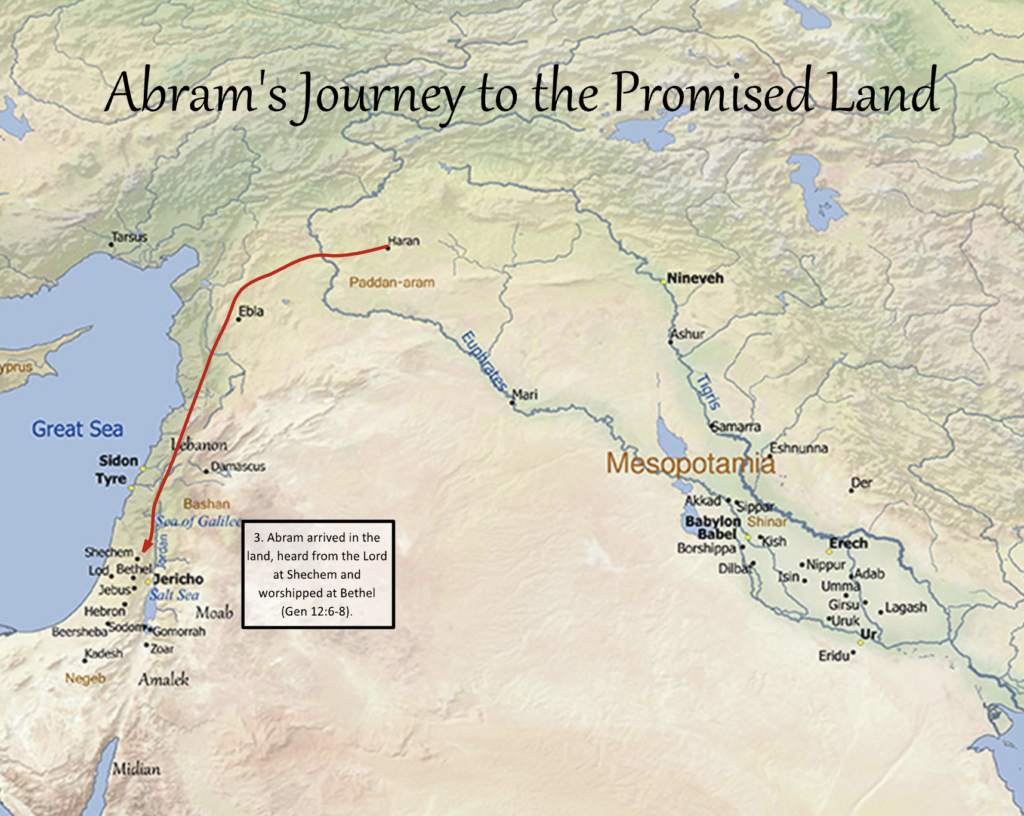 Image Credit: Detail of a Map from the Student Bible Atlas by Tim Dowley
Image Credit: Detail of a Map from the Student Bible Atlas by Tim Dowley
Genesis 12: The Call of Abram
12 The Lord had said to Abram, “Go from your country, your people and your father’s household to the land I will show you.
2 “I will make you into a great nation,
and I will bless you;
I will make your name great,
and you will be a blessing.[a]
3 I will bless those who bless you,
and whoever curses you I will curse;
and all peoples on earth
will be blessed through you.”[b]
4 So Abram went, as the Lord had told him; and Lot went with him. Abram was seventy-five years old when he set out from Harran. 5 He took his wife Sarai, his nephew Lot, all the possessions they had accumulated and the people they had acquired in Harran, and they set out for the land of Canaan, and they arrived there.
6 Abram traveled through the land as far as the site of the great tree of Moreh at Shechem. At that time the Canaanites were in the land. 7 The Lord appeared to Abram and said, “To your offspring[c] I will give this land.” So he built an altar there to the Lord, who had appeared to him.
8 From there he went on toward the hills east of Bethel and pitched his tent, with Bethel on the west and Ai on the east. There he built an altar to the Lord and called on the name of the Lord.
9 Then Abram set out and continued toward the Negev. Image Credit: Detail of a Map from the Student Bible Atlas by Tim Dowley
Image Credit: Detail of a Map from the Student Bible Atlas by Tim Dowley
On the above map, the red arrow is pointing at Bethel, where Abraham first pitched his tent.
On the map below, that area is enlarged.

Image Credit: Kuki’s
Bethel is in the West Bank–not far from the Gaza Strip.

Image Credit: Encyclopedia Britannica
The above map shows the area of Bethel, relative to that of the Gaza Strip.
What is the West Bank?
“West Bank, area of the former British-mandated (1920–47) territory of Palestine west of the Jordan River, claimed from 1949 to 1988 as part of the Hashemite Kingdom of Jordan but occupied from 1967 by Israel. The territory, excluding East Jerusalem, is also known within Israel by its biblical names, Judaea and Samaria.” Britannica
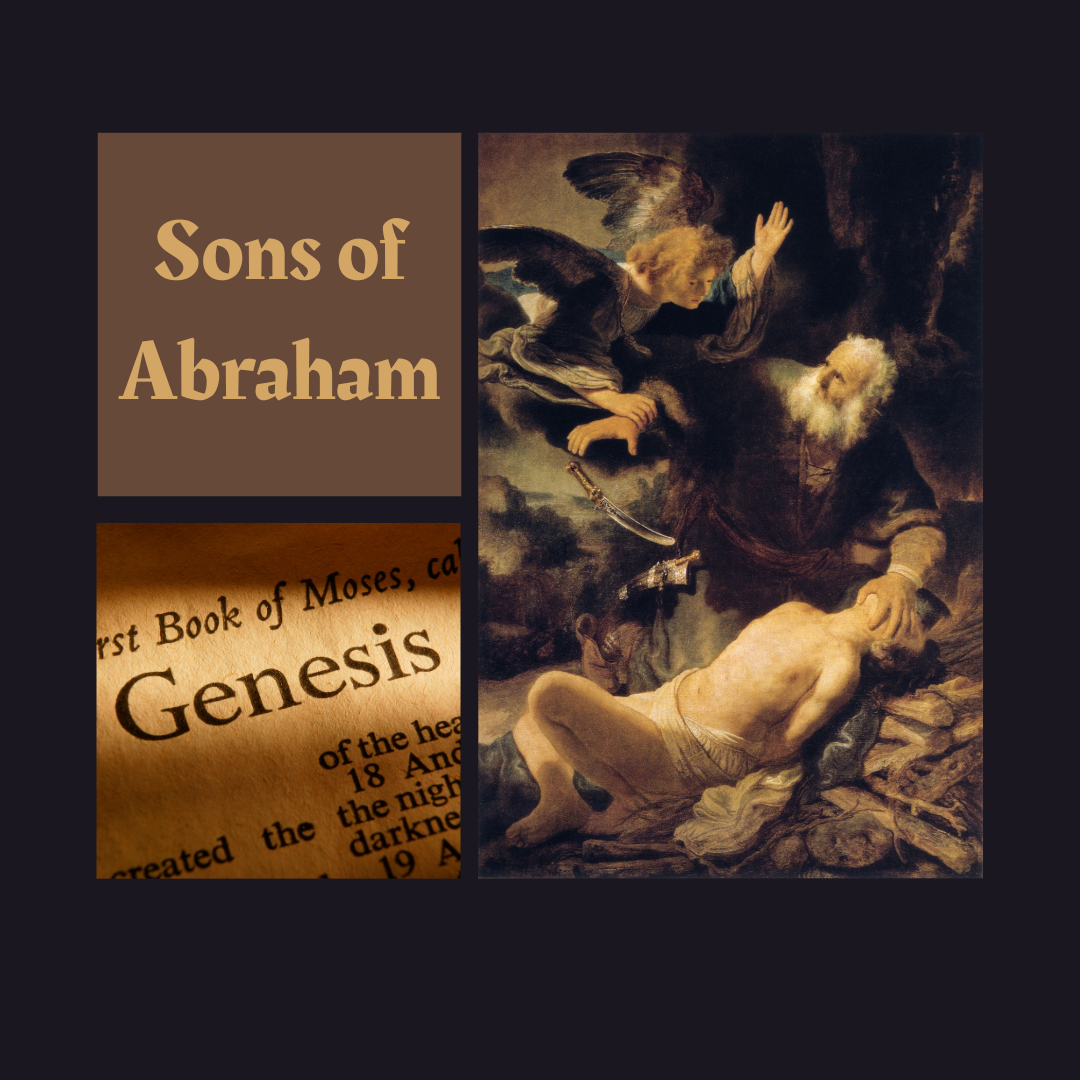
It is important to note that, according to the Bible, Abraham had at least 8 sons, but tradition says that he only claimed 7 of thoses sons as legitimate. As Abraham and his family moved into Canaan, his sons spread over several regions in and near the area where Abraham “pitched his tent.” If you accept the fact that Abraham’s oldest son Ishmael was illegitimate and not one of Abraham’s 7 claimed sons, the children’s song is correct: “Father Abraham had Seven Sons….”
But the truth is that Abraham had at least one more son named Ishmael, and the fact that Abraham had that other son [the one he did not claim] became a problem. In my experience, that scenario is still problematic today.
Although this is simplistic, the wars in the Middle East may have begun because Abraham had a son he did not claim. At the very least, we could say that Abrahm and his sons developed a terrilbe case of “family trouble,” and the impact of that trouble is still evident today. Before we devlop that idea, however, we need to back up our story a bit.
In brief review, after God expelled Adam and Eve from the garden of Eden, His people became more and more wicked, until He told one of his faithful followers Noah to build an ark.

ENTERING THE ARK.
Noah saved his family and a pair of every species of animals from the Great Flood, and after that flood, the world began again. But after the flood, Noah’s sons and their families separated–and God’s people spread across a larger region of the Mideast. Although Abraham originally lived in an area near the Garden of Eden, his descendants began populating lands other than that in Mesopotamia. They settled in the Promised Land of Canaan. [Yes, the same Promised Land toward which Moses led the Israelites again in Exodus.]

Although there were many years between the lives of each of the men in the above chart, both Noah and Abraham were descendants of Adam and Eve’s son Shem. That line continues to the birth of Jesus, but the other descendants of Adam and Eve dispersed to many other regions of the earth.
When Abraham and his sons left Ur, they continued to disperse to several more regions. Am I the only person who sees a situation that would be rife with family jelousies and snares? And then, Abraham had another pack of sons, too [And Yet, Abraham Had One Favorite Son — Isaac].
I won’t muddy the water now, but another descendent had a favorite son, too, and he gave that son a special “coat of many colors.” Again, that father’s behavior caused more family strife. But back to Abraham and his sons:
Genesis 25: Abraham and Keturah
25 Abraham again took a wife, and her name was Keturah. 2 And she bore him Zimran, Jokshan, Medan, Midian, Ishbak, and Shuah. 3 Jokshan begot Sheba and Dedan. And the sons of Dedan were Asshurim, Letushim, and Leummim. 4 And the sons of Midian were Ephah, Epher, Hanoch, Abidah, and Eldaah. All these were the children of Keturah.
5 And Abraham gave all that he had to Isaac. 6 But Abraham gave gifts to the sons of the concubines which Abraham had; and while he was still living he sent them eastward, away from Isaac his son, to the country of the east
Although Abraham kicked Ishmael and his mother out, Ishmael did not desist.
Abraham expelled his olest son Ishmael and his mother long before any of the other sons were born. Ishmael and his mother were no longer convenient for Abraham. But they did not go gently into that good night. Why should they?
“The past is never dead. It’s not even past” – William Faulkner
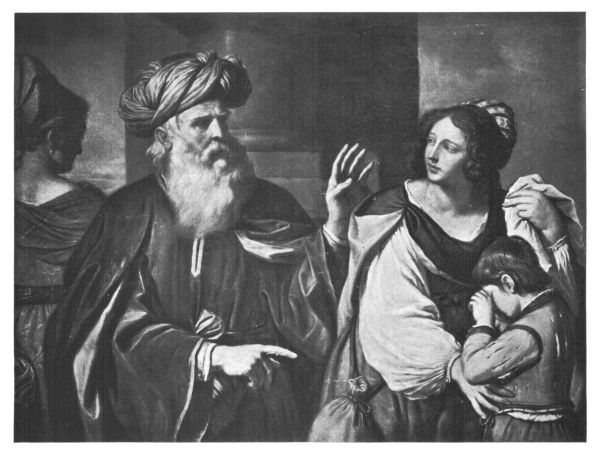
IN THE BRERA, MILAN
Hagar and Ishmael
Genesis 16
16 Now Sarai, Abram’s wife, had borne him no children. But she had an Egyptian slave named Hagar;2 so she said to Abram, “The Lord has kept me from having children. Go, sleep with my slave; perhaps I can build a family through her.”
Abram agreed to what Sarai said. 3 So after Abram had been living in Canaan ten years, Sarai his wife took her Egyptian slave Hagar and gave her to her husband to be his wife. 4 He slept with Hagar, and she conceived.
When she knew she was pregnant, she began to despise her mistress. 5 Then Sarai said to Abram, “You are responsible for the wrong I am suffering. I put my slave in your arms, and now that she knows she is pregnant, she despises me. May the Lord judge between you and me.”
6 “Your slave is in your hands,” Abram said. “Do with her whatever you think best.” Then Sarai mistreated Hagar; so she fled from her.
7 The angel of the Lord found Hagar near a spring in the desert; it was the spring that is beside the road to Shur. 8 And he said, “Hagar, slave of Sarai, where have you come from, and where are you going?”
“I’m running away from my mistress Sarai,” she answered.
9 Then the angel of the Lord told her, “Go back to your mistress and submit to her.” 10 The angel added, “I will increase your descendants so much that they will be too numerous to count.”
11 The angel of the Lord also said to her:
“You are now pregnant
and you will give birth to a son.
You shall name him Ishmael,[a]
for the Lord has heard of your misery.
12 He will be a wild donkey of a man;
his hand will be against everyone
and everyone’s hand against him,
and he will live in hostility
toward[b] all his brothers.
Genesis 25: Ishmael moves to Shur
The Families of Ishmael
, 18 (They dwelt from Havilah as far as Shur, which is east of Egypt as you go toward Assyria.) He [c]died in the presence of all his brethren.
From the time of his early childhood, Ishmael was disconnected from Abraham’s other sons. Ishmael’s own father rejected him. 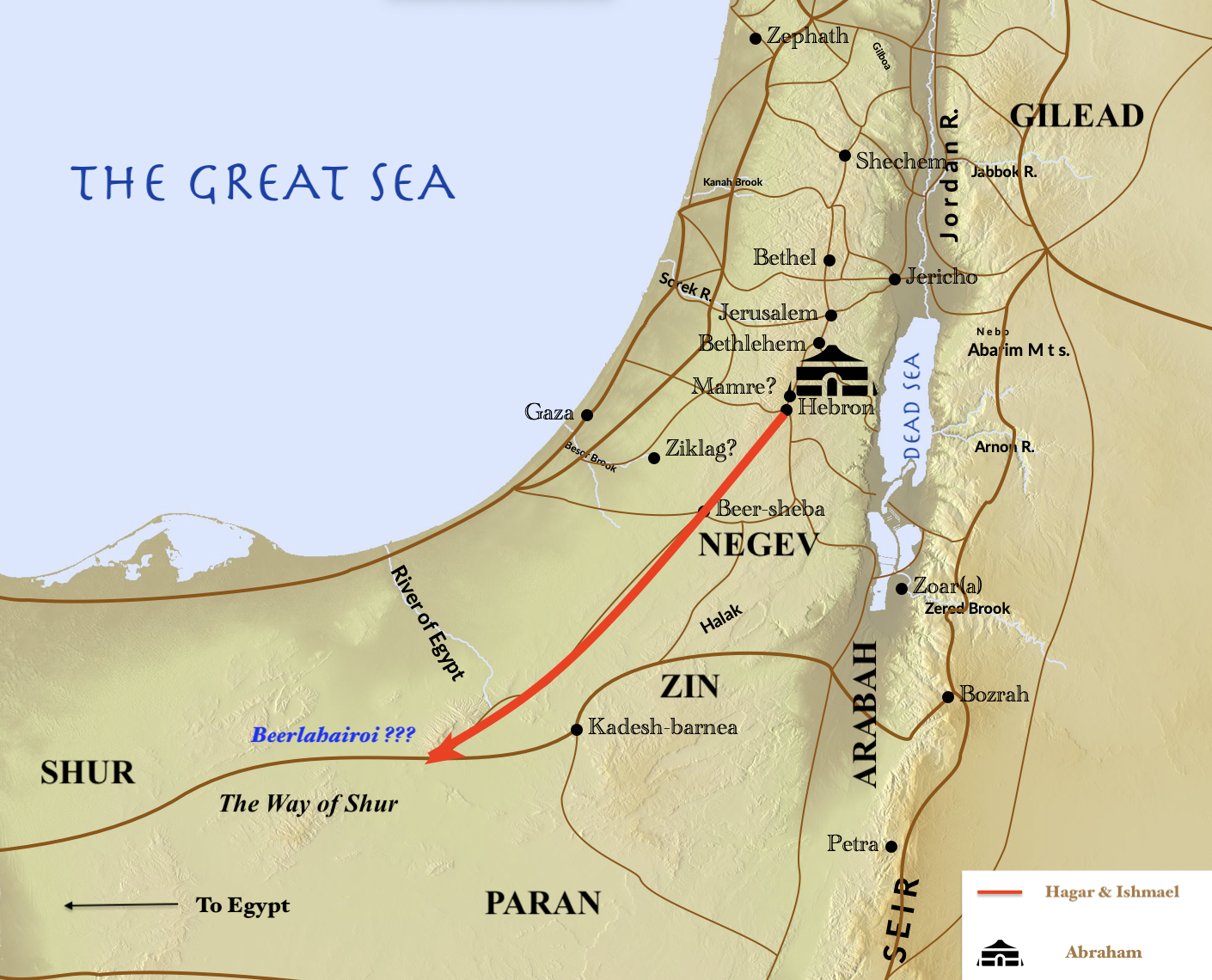
Isaac and his family lived in Canaan, and Isaac’s other brothers moved east of that.
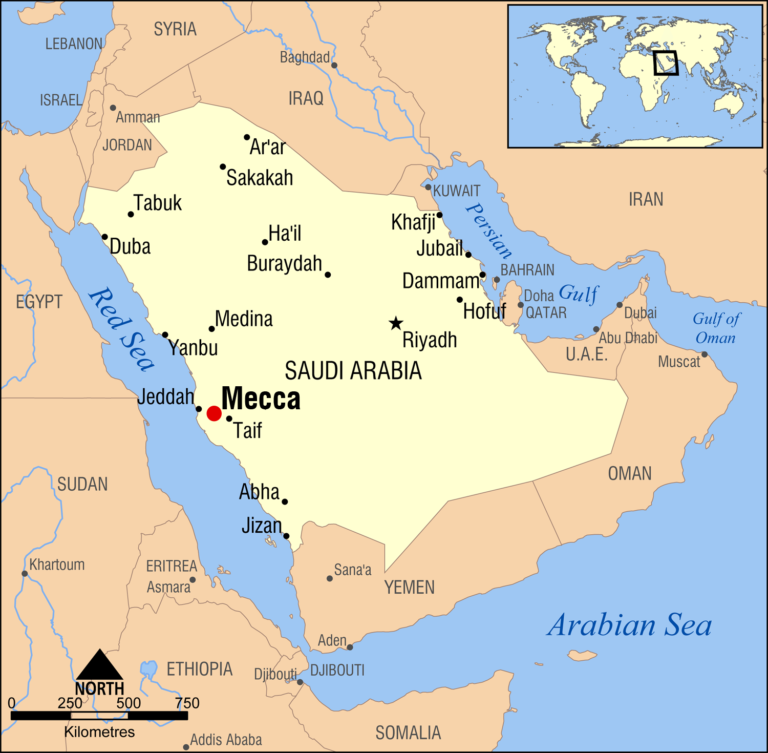


I’ll conclude by saying that I personally do not believe that any warlike effort to try to stand as the “right” people is sustainable. I do not pray for either side of the warring Middle East to win the war. I pray for peace–in spite of the fact that both sides have erred.
Sometimes, we just need to walk away.
Discover more from Jacki Kellum
Subscribe to get the latest posts sent to your email.